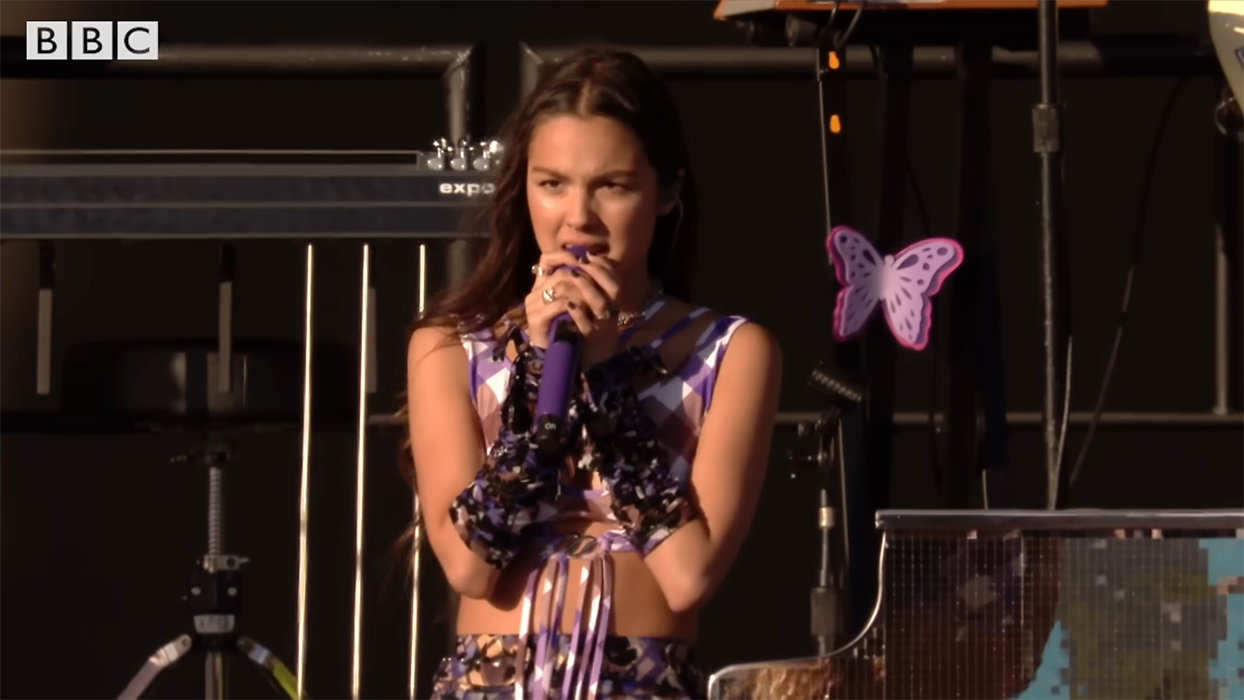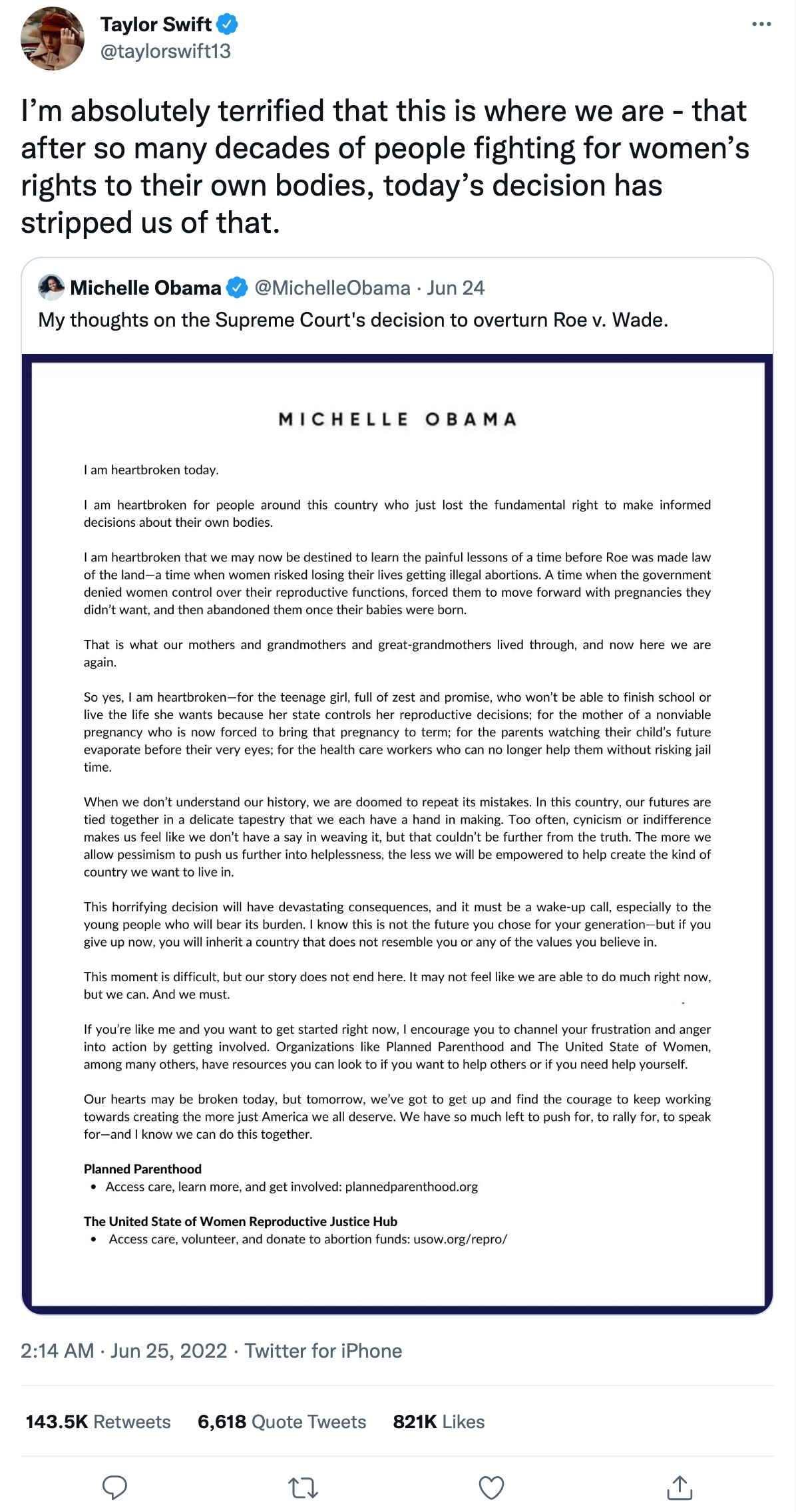
On June 24, the Supreme Court of the United States overturned the landmark Roe v. Wade case that for 49 years had guaranteed women the fundamental and constitutional right to an abortion. Glastonbury Festival, a major global music event in the United Kingdom and held this year for the first time in three years due to the pandemic, became a platform to denounce the US Supreme Court. Headlining the first day of the event, Billie Eilish called it a “dark day for women in the US” during her performance.
The following day, the Disney star-turned-musician known for hits like “drivers license” and “good 4 u” and worldwide Generation Z symbol Olivia Rodrigo continued the scathing rebuke. As she introduced guest Lily Allen to Glastonbury’s Other Stage, Rodrigo called out the Supreme Court Justices who voted to overturn Roe v. Wade one after the other by name:
“I’m devastated and terrified. So many women and so many girls are going to die because of this. I wanted to dedicate this next song to the five members of the Supreme Court who have shown us that at the end of the day, they truly don’t give a sh** about freedom. The song goes out to the justices: Samuel Alito, Clarence Thomas, Neil Gorsuch, Amy Coney Barrett, Brett Kavanaugh. We hate you.” It wasn’t difficult for fans to guess what song was coming next: Allen’s 2009 hit, “F**k You.”
Kendrick Lamar, the man behind Mr. Morale & the Big Steppers, one of the year’s best albums, headlined the festival on Sunday, the day of Jesus’ resurrection three days after crucifixion, wearing a crown of thorns. He closed his final song “Savior” in an impassioned tableau with his group of backup dancers, his eyes tightly closed as fake blood dripped from the crown onto his white shirt, and ultimately dropped his microphone and walked offstage after repeatedly shouting two lines new to everyone’s ears:
“Godspeed for women’s rights. They judge you, they judge Christ.” Festivalgoers heard numerous messages of condemnation against the Roe v. Wade reversal throughout the week. Countless female singer-songwriters, including Phoebe Bridgers and Lorde, rallied with cries of, “F**k the Supreme Court.” IDLES vocalist Joe Talbot told the audience, “They’ve just reversed the laws back to the Middle Ages in America.” This year’s Glastonbury Festival served a political purpose and opened the world’s eyes to just how grave the consequences of the US Supreme Court’s ruling are even across the ocean.
Roe v. Wade was a 1973 case in which the US Supreme Court sided with Roe, the pseudonym for a then anonymous woman who was denied an abortion under Texas law who then called the denial unconstitutional and filed her case against Texas prosecutor Henry Wade. The Roe decision, which stated that “inherent in the Due Process Clause of the Fourteenth Amendment is a fundamental ‘right to privacy’ that protects a pregnant woman’s choice whether to have an abortion,” was a remarkable milestone and a symbol of women’s rights in American society. The ruling remains a controversial topic 49 years later. The conservative Supreme Court Justices had long been meticulously devoted to leveraging their position in an attempt to overturn Roe while the liberal Justices worked to maintain the ruling that guaranteed the protection of women’s rights.
Those keeping an eye on the current political landscape in the US knew that Roe v. Wade was under threat. The US Supreme Court is made up of nine Justices, all appointed by the nation’s president and who take office once approved by the Senate. Whether a Justice leans conservative or liberal is particularly important as they hold the position for life. As of this year, six of the Justices were appointed by Republican presidents and three by Democratic presidents, meaning the current Supreme Court as a whole leans conservative. The decisive factor leading to the reversal of Roe was former President Donald Trump and his promise to appoint enough Justices to overturn the ruling—a promise he kept by putting three Justices on the bench while he was in office: Neil Gorsuch, Brett Kavanaugh and Amy Coney Barrett.
Things had already crossed the Rubicon on May 2 when political media outlet POLITICO leaked a draft decision of the Roe v. Wade reversal. And yet, when the ruling was officially laid down, the impact was even greater than feared. In a 6–3 decision regarding Dobbs v. Jackson Women’s Health Organization, the Supreme Court voted in favor of a Mississippi law that bans abortion after 15 weeks of pregnancy.
Immediately after the outcome was announced, reports on the level of a national emergency flooded the US mainstream media. Amid the clash of overjoyed pro-life activists and the devastated pro-choice side, what was certain was that the human rights of US women, and particularly the rights of the underprivileged, had been dealt a severe and regressive blow.
In a concurring opinion, hard-line conservative Justice Clarence Thomas expressed his belief that this case reveals “demonstrably erroneous” decisions in cases like Griswold v. Connecticut, Lawrence v. Texas and Obergefell v. Hodges, which should now be reconsidered. (Griswold bars the state from interfering in a married couple’s use of contraceptives, Lawrence repealed Texas’ anti-sodomy laws and Obergefell legalized same-sex marriage.) The dismantling of Roe v. Wade is only the beginning. The US has been swept with an uneasy feeling that the Supreme Court is turning back the clock on history.
Thirteen of the 50 states that make up the US already had so-called trigger laws in place in anticipation of the Supreme Court decision, making abortion illegal in those places immediately upon the Roe ruling. In other words, 36 million women of reproductive age now live in states that block abortion rights. More than half of all Americans believe the reversal of Roe is wrong, but public opinion holds no sway over the Court.
Beyond the pop stars who were at Glastonbury, countless other figures have been bringing comfort to everyone hurt by and voicing their anger and concern over the reversal of Roe v. Wade. Taylor Swift retweeted former First Lady Michelle Obama’s statement on Twitter, adding she was terrified “that after so many decades of people fighting for women’s rights to their own bodies,” the Supreme Court “decision has stripped us of that.” In a monologue laced with blue language, Green Day lead singer Billie Joe Armstrong vowed in a concert at London Stadium to renounce his US citizenship and move to the UK.
There are also clear moves being made in preparation for a post-Roe world. The official account for Olivia Rodrigo fans, @livieshq, followed up on the singer’s joint performance of “F**k You” with Lily Allen by starting a fundraiser for Planned Parenthood. Artist Lizzo, who inspires self-esteem in women with her contributions to body positivity, including through songs like “Juice” and “Truth Hurts,” pledged to donate $1 million to abortion rights groups.
The cries of artists and minorities will never reach the ears of the Supreme Court Justices where they sit on high, but their efforts are well worth it for the light they provide that cuts through the darkness of these trying times. Justices are secure in their life terms, and musicians can neither kick them out nor revert the new Roe v. Wade outcome. But the names of those Justices who have deprived women of their human rights will be remembered forever for being on the wrong side of history. Meanwhile, the artists who side with the public through their brave words will be revered by the affected individuals upon whose lives they shine a ray of hope. Music shall save us from these dark times.
Unauthorized reproduction and distribution prohibited.
